from today's Word a Day:
coxcomb (KOKS-kom) noun
A conceited man excessively interested in his appearance and dress;
a fop.
[A variant of cock's comb (a rooster's crest).]
Jesters in medieval courts wore a cap with red strips like those in
a rooster's crest. From there the sense of the term extended to a
vain, pretentious dandy. Today we would describe him as metrosexual.
*
Court jester, to Wilde dandy, to Beckam metrosexual? Hmmm. What's missing is the wit.
Wednesday, January 31, 2007
Tuesday, January 30, 2007
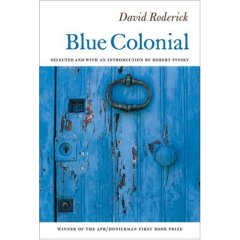
Reading David Roderick's Blue Colonial, winner of the recent APR/Honickman. What a beautiful cover: the blue on the door is just luscious. Favorite poem: "The Makers of the American Language," which is full of wonderful sounds and rhythms and begins:
Strangers. Saints. Blazers of sphagnum and sap.
Trodden men with the land o'erturned on their crowns.
Oyster-shell plasterers. Shit shovelers.
Seed-sowing hands when the crabapple buds
grew as big as the balls of a bull.
pg. 29
*
 Also reading Jean-Paul Pecqueur's The Case Against Happiness. I didn't realize till I read the liner notes that he had a Seattle connection, having attended UW's MFA program in the past. Fun, playful, intelligent poems throughout (notice the vacuum cleaner instead of a gun in the cowboy's hand on the cover). A couple of my favorite lines:
Also reading Jean-Paul Pecqueur's The Case Against Happiness. I didn't realize till I read the liner notes that he had a Seattle connection, having attended UW's MFA program in the past. Fun, playful, intelligent poems throughout (notice the vacuum cleaner instead of a gun in the cowboy's hand on the cover). A couple of my favorite lines:Asked where I wanted her to place the flowers
I responded that everywhere would be fine.
--from "What We Want When We Want It." pg. 39
Great acting and crying on cue
are not the same thing.
--from "Hollywood West" pg. 14
And the wacky O'Hara-esque poem "Patty Suddenly:"
then suddenly Patty not.
There were engines in the wings
then the noise receded,
drawing with it the racetracks
and hat racks and my Delaware
oh so unaware. I was the not-
for-profit sighing society
fussing about all the central authority
before one day Patty suddenly
then suddenly Patty not.
The day was hot. The year was 1989.
The modern age was sinking
into the parched soil of the Po-Mo world.
Fantastical things were growing.
Glowing breathing tubes for one.
Intolerance for intolerance.
A damned dodgy, doggy-dog world,
for decades, every time I awoke
it was morning — How Boring! —
until suddenly Patty suddenly
then suddenly Patty not!
I don't quite understand exactly what "Patty" is all about. But a line like "Intolerance for intolerance" is enough to keep me interested.
*
Sunday, January 28, 2007
What'cha Doin' Tuesday Night?
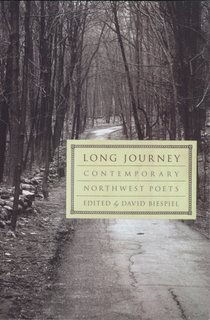 Jan. 30, 7:30 PM
Jan. 30, 7:30 PM Richard Hugo House
"Long Journey: Contemporary Northwest Poets." A dozen of Seattle's leading poets in one reading: Kevin Craft, Madeline DeFrees, Neile Graham, Jana Harris, Francis McCue, Colleen McElroy, Peter Pereira, Martha Silano, Joan Swift, David Wagoner, Emily Warn and Carolyne Wright will join editor David Biespiel to celebrate the publication of this groundbreaking anthology. Co-sponsored by Richard Hugo House.
Friday, January 26, 2007

A copy of What's Written on the Body arrived this afternoon, and it is just GORGEOUS! I love it I love it I love it. And it is so nice to finally be able to hold it in my hands. Phil Kovacevich did a terrific job with the cover (thank you). I love the blurbs that were chosen for the back cover, and my little author photo, and the image of a man's nude back, and everything. I can hardly wait to read from it! (Actually, I opened Body up and read "Tete-a-Tete" out loud in the living room to myself, and it felt wonderful). Tonight Dean and I are going out with our friends Kevin and Bob, and I am pretty sure a martini or two will be hoisted in the air in celebration. Cheers!
*
PS: What's Written on the Body is available to bookstores through Consortium (Copper Canyon's distributor), and it's available for pre-order at Amazon, B & N, SPD, Powell's, and all the usual places. I'll have copies for the ASU Writer's Conference. Or you can come by Copper Canyon's table at AWP, and I'd be delighted to sign a copy for you.
Thursday, January 25, 2007
Sweet!
Michael from Copper Canyon called this evening to say some advance copies of What's Written on the Body had arrived from the printer, that they were beautiful, perfect, and that they had Fedexed a couple copies my way. I might receive them tomorrow! OMG. I am so excited! Everybody at CCP has been incredibly thoughtful and wonderful to work with. I am so appreciative. Too bad I have to work tomorrow. Otherwise, I'd be camped out by the mailbox with bells on.
Wednesday, January 24, 2007
State of the Dis-Union
Bush did not mention New Orleans or Katrina, not once, in his entire lame-ass speech. Not once. Not once! 17 months later and people in the South are still living in trailers, children are still on waiting lists to get back into schools, block after block in several cities and towns is abandoned and overrun with rats. The largest natural disaster in our nation's history, and our president, our doofus dumb-shit horse's ass president, has not one word of hope, one encouraging thought, one bit of additional funding to offer in his "state of the union" address? Gimme a break. If I were a New Orleanian (for instance), I'd be furious. Bush is either a total idiot, or has no sense of human compassion, or (probably) both. And don't even get me started on his dopey "surge" plan.
*
We now return you to your regular programming.
*
We now return you to your regular programming.
Tuesday, January 23, 2007
Oliver and Brent with some posts recently about Rube Goldberg poems.
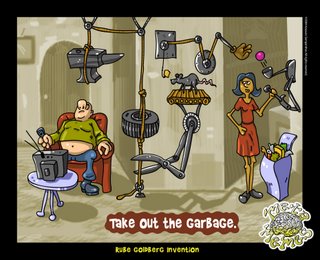
Goldberg, Rube (Reuben Lucius Goldberg), 1883–1970, American cartoonist and sculptor, b. San Francisco. After drawing cartoons for San Francisco newspapers, he moved to New York City. There he worked for the New York Evening Mail until his cartoons became syndicated in 1921. Goldberg originated the successful comic strip “Boob McNutt” and the panel series “Foolish Questions.” He is known for his drawings of ludicrously intricate machinery meant to perform simple operations. Goldberg worked as a political cartoonist for the New York Sun and later for the New York Journal American. After 1964 he concentrated on sculpture. He is the author of How to Remove the Cotton from a Bottle of Aspirin (1959) and Rube Goldberg vs. the Machine Age (1968).

Goldberg, Rube (Reuben Lucius Goldberg), 1883–1970, American cartoonist and sculptor, b. San Francisco. After drawing cartoons for San Francisco newspapers, he moved to New York City. There he worked for the New York Evening Mail until his cartoons became syndicated in 1921. Goldberg originated the successful comic strip “Boob McNutt” and the panel series “Foolish Questions.” He is known for his drawings of ludicrously intricate machinery meant to perform simple operations. Goldberg worked as a political cartoonist for the New York Sun and later for the New York Journal American. After 1964 he concentrated on sculpture. He is the author of How to Remove the Cotton from a Bottle of Aspirin (1959) and Rube Goldberg vs. the Machine Age (1968).
Monday, January 22, 2007
The Dog Whisperer

I love watching Cesar Millan's dog training show. It is simply fascinating, his approach to dogs. How he gets even the most out-of-control poodle into a "calm submissive state" with just a little "sssss." Note: It even works on people. Just try it at work! haha
The other night he was working with a young gay couple and their three tiny yipping nipping out-of-control chiuaua mixes. I nearly died laughing when he said to them, referring to how to be the "pack leader:" "I'm not being mean, I'm just topping you."

Sunday, January 21, 2007
What I've Been Reading:
Decreation, Anne Carson (again). The essay about Sappho, Marguerite Porete, and Simone Weil, and the idea of decreation in the lives and work of these three women, is fascinating. And it adds to the pleasure of the poem-opera, "Decreation," that follows. Carson is brilliant.
Radio Crackling, Radio Gone, Lisa Olstein. The newest Hayden Carruth Award winner's first book. "Down to the Finest Particles of Every Spiraling Strand" is wonderful. Congrats!
Whirligig, Christopher Salerno. Good poems throughout. Interesting cover (is that a propeller coming out of the toy's butt?). From Spuyten Duyvil Press.
The Silver Palace Restaurant, Mark Abley. I bought this book for the pat of very real-looking butter melting in a cast iron skillet on its wonderful cover. I love the series of Pinocchio poems that open the collection. From the same Canadian press that published Rachel Rose's Giving My Body to Science.
When the Eye Forms, Dwaine Rieves. Yet another book of poems from yet another poet-doctor (we could start a club, or at least a support group, hehehe). I enjoyed the poems, their light-hearted playfulness, but was his Washington DC clinic really called "The Gay Men's VD Clinic?" VD?
Ooga-Booga, Frederick Seidel. Just started this one. He is such a wise guy. The Jack Nicholson of poetry, I'd say.
Body Language: Poems of the Medical Training Experience. From students to interns to residents to attendings. A large number of family physicians and ER docs represented here. Hmmm.
The Martini, Barnaby Conrad III: a gift from from a friend. Full of history and wonderful photos of movie stars boozing it up.
Decreation, Anne Carson (again). The essay about Sappho, Marguerite Porete, and Simone Weil, and the idea of decreation in the lives and work of these three women, is fascinating. And it adds to the pleasure of the poem-opera, "Decreation," that follows. Carson is brilliant.
Radio Crackling, Radio Gone, Lisa Olstein. The newest Hayden Carruth Award winner's first book. "Down to the Finest Particles of Every Spiraling Strand" is wonderful. Congrats!
Whirligig, Christopher Salerno. Good poems throughout. Interesting cover (is that a propeller coming out of the toy's butt?). From Spuyten Duyvil Press.
The Silver Palace Restaurant, Mark Abley. I bought this book for the pat of very real-looking butter melting in a cast iron skillet on its wonderful cover. I love the series of Pinocchio poems that open the collection. From the same Canadian press that published Rachel Rose's Giving My Body to Science.
When the Eye Forms, Dwaine Rieves. Yet another book of poems from yet another poet-doctor (we could start a club, or at least a support group, hehehe). I enjoyed the poems, their light-hearted playfulness, but was his Washington DC clinic really called "The Gay Men's VD Clinic?" VD?
Ooga-Booga, Frederick Seidel. Just started this one. He is such a wise guy. The Jack Nicholson of poetry, I'd say.
Body Language: Poems of the Medical Training Experience. From students to interns to residents to attendings. A large number of family physicians and ER docs represented here. Hmmm.
The Martini, Barnaby Conrad III: a gift from from a friend. Full of history and wonderful photos of movie stars boozing it up.
Saturday, January 20, 2007

Went to the opening of the new Olympic Sculpture Park with my friend Jeff. What an amazing space! Starting amid driftwood and beach sand at the waterfront, you cross several footpaths and bridges over railroad tracks and highways, to several terraces of grassy fields with outdoor art installations. My favorite was "Love & Loss" which is a picnic table and benches shaped like the words "love" and "loss" (the "V" of love is the "V" of a tree's bifurcating trunk; the ampersand is a neon red tube of light).
 I also loved the giant typewriter eraser, which sits on a lawn overlooking Western Avenue. But the most famous piece is "Wake" by Richard Serra, which I thought was pretty boring, all rusted brown metal, in a shady corner, with no real sense of scale or originality, and already covered with scratched in graffiti. Why in the hell would you have outdoor art with signs that say "Don't touch. It harms the art?" What idiocy is this? Jeff and I used a magic marker to change some of the signs to say "Do touch. It charms the art." Hehehehe. We so bad. We have so much fun.
I also loved the giant typewriter eraser, which sits on a lawn overlooking Western Avenue. But the most famous piece is "Wake" by Richard Serra, which I thought was pretty boring, all rusted brown metal, in a shady corner, with no real sense of scale or originality, and already covered with scratched in graffiti. Why in the hell would you have outdoor art with signs that say "Don't touch. It harms the art?" What idiocy is this? Jeff and I used a magic marker to change some of the signs to say "Do touch. It charms the art." Hehehehe. We so bad. We have so much fun.Later J and I went to the memorial for Chris Stern, the inimitable letterpress artist and typography guru. It took place at the Seattle School of Visual Concepts, and was just packed with friends, students, associates, and fellow free spirits and old hippies. So sad to know that he has passed on. Best wishes to Jules.
Friday, January 19, 2007
I *Heart* Jake G
Who knew he could sing?
*
A fascinating post by Charles about "Accessibility vs Engagement." Go and check it out here.
Eduardo's Double Entendre contest is in full sway.
C Dale's new book is out.
Chalk and old bookstores are giving Barbara Jane RAD.
Richard is counting crows.
Jilly links us to The Complete Moron's Guide to: World Poetic Forms.
Rebecca's Surfer is getting some cool shoes.
Dean and I are heading out tonight for here.
Thursday, January 18, 2007
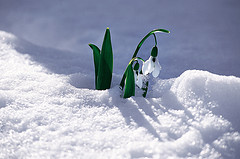 The snow has almost all melted. Even though it is only January 18th, I want to believe Spring is on its way, and with it, poetry. Speaking of which, The Seattle Arts and Lectures Poetry Series lineup this year is:
The snow has almost all melted. Even though it is only January 18th, I want to believe Spring is on its way, and with it, poetry. Speaking of which, The Seattle Arts and Lectures Poetry Series lineup this year is:Mark Strand Feb 27
Kevin Young March 13
Carolyn Forche March 26
Charles Simic April 10th
These readings should each be wonderful, but I am especially looking forward to Carolyn Forche, who continues to be a touchstone for me. Her 24 page abecedarian, "On Earth," from Blue Hour is one of the most amazing things I have ever read. I wonder if she has a new book coming? See you there . . .
Tuesday, January 16, 2007
Monday, January 15, 2007
We Shall Overcome
MLK Holiday Timeline
1968: Martin Luther King, Jr. assassinated; Rep. John Conyers, D-Mich., introduces legislation for federal holiday to commemorate King
1973: Illinois is first state to adopt MLK Day as a state holiday
1983: Congress passes, President Reagan signs, legislation creating Martin Luther King, Jr. Day
1986: Federal MLK holiday goes into effect
1987: Arizona governor Evan Mecham rescinds MLK Day as his first act in office, setting off a boycott of the state.
1989: State MLK holiday adopted in 44 states
1991: The NFL moves the 1993 Super Bowl site from Phoenix, Ariz., to Pasadena, Calif., because of the MLK Day boycott.
1992: Arizona citizens vote to enact MLK Day. The Super Bowl is held in Tempe, Ariz. in 1996.
1993: For the first time, MLK Day is held in some form—sometimes under a different name, and not always as a paid state holiday—in all fifty states.
1999: New Hampshire becomes the last state to adopt MLK Day as a paid state holiday, replacing its optional Civil Rights Day.
2000: Utah becomes the last state to recognize MLK Day by name, renaming its Human Rights Day state holiday.
2000: South Carolina becomes the last state to make MLK Day a paid holiday for all state employees. Until now, employees could choose between celebrating it or one of three Confederate-related holidays.
*
WTF is a "confederate-related holiday?"
1968: Martin Luther King, Jr. assassinated; Rep. John Conyers, D-Mich., introduces legislation for federal holiday to commemorate King
1973: Illinois is first state to adopt MLK Day as a state holiday
1983: Congress passes, President Reagan signs, legislation creating Martin Luther King, Jr. Day
1986: Federal MLK holiday goes into effect
1987: Arizona governor Evan Mecham rescinds MLK Day as his first act in office, setting off a boycott of the state.
1989: State MLK holiday adopted in 44 states
1991: The NFL moves the 1993 Super Bowl site from Phoenix, Ariz., to Pasadena, Calif., because of the MLK Day boycott.
1992: Arizona citizens vote to enact MLK Day. The Super Bowl is held in Tempe, Ariz. in 1996.
1993: For the first time, MLK Day is held in some form—sometimes under a different name, and not always as a paid state holiday—in all fifty states.
1999: New Hampshire becomes the last state to adopt MLK Day as a paid state holiday, replacing its optional Civil Rights Day.
2000: Utah becomes the last state to recognize MLK Day by name, renaming its Human Rights Day state holiday.
2000: South Carolina becomes the last state to make MLK Day a paid holiday for all state employees. Until now, employees could choose between celebrating it or one of three Confederate-related holidays.
*
WTF is a "confederate-related holiday?"
Children of Men?
 Saw Children of Men last night. What a dark and disturbing movie. As you know, it is based on a PD James novel from 1992, set in a future dystopia, where the world is collapsing in the wake of a plague of infertility, no babies have been born anywhere in the world in almost 20 years. There are crumbling buildings everywhere, military police, caged refugees (exactly why is unclear), street violence and muggings, it's all very bad. Clive Owen somehow gets swept up in a plot to smuggle an undisovered 8-month-pregnant refugee out of England, to a safe island where the "Human Project" is. Perhaps it made more sense in the novel, which I haven't read. Michael Caine is funny as a pot-smoking hippie in the woods. Julianna Moore has a short-lived performance (no pun intended). Our hero Clive Owen is ridiculous running around in a black suit and flip-flops through the rubble and gunfire of the refugee camp, then pouring a pint of whiskey over the mother's pudenda as the baby is crowning. Go see it if you don't have anything better to do, or have a hankering for senseless gratuitous violence. Or kitschy Christ Child imagery.
Saw Children of Men last night. What a dark and disturbing movie. As you know, it is based on a PD James novel from 1992, set in a future dystopia, where the world is collapsing in the wake of a plague of infertility, no babies have been born anywhere in the world in almost 20 years. There are crumbling buildings everywhere, military police, caged refugees (exactly why is unclear), street violence and muggings, it's all very bad. Clive Owen somehow gets swept up in a plot to smuggle an undisovered 8-month-pregnant refugee out of England, to a safe island where the "Human Project" is. Perhaps it made more sense in the novel, which I haven't read. Michael Caine is funny as a pot-smoking hippie in the woods. Julianna Moore has a short-lived performance (no pun intended). Our hero Clive Owen is ridiculous running around in a black suit and flip-flops through the rubble and gunfire of the refugee camp, then pouring a pint of whiskey over the mother's pudenda as the baby is crowning. Go see it if you don't have anything better to do, or have a hankering for senseless gratuitous violence. Or kitschy Christ Child imagery.On another note, I wrote a short story in the late 1980's called "Waiting for Moly Sam," which had a very similar plot: set in the future, after a plague of infertility. But in my story a Cambodian girl one day walks out of her jungle village to go to the city for supplies, 8 months pregnant, and causes a world media sensation (US and WHO scientists studying her, huge refugee camps set up so pilgrims can come and be present for her birth, the whole world watching her daily via satellite addresses), until she disappears in the night, perhaps kidnapped, perhaps escaped. Now I want to make my story into a movie. It'd be so much better. Haha.
Sunday, January 14, 2007
I drove out on the icy snowy streets to attend a poetry reading at Richard Hugo House last night. I met up with several friends (KF, SR, TM) there in the Cabaret, which has a small well-lit stage, a dozen or so glass-topped cafe tables, light snacks, beer & wine for sale (but no espresso, thank god: it's too noisy). The setting is very bohemian, and perfect for a poetry reading. Tonight it was Jenifer Lawrence and Terry Martin reading from their new books from Blue Begonia Press, One Hundred Steps from Shore and The Secret Language of Women. Good reading: some of my favorite parts were Terry's poems about her partner's breast cancer, and Jenifer's poems about a chain-sawed plum tree and a star-crossed omen-filled wedding.
*
The Husky men are 1-5 in conference after losing another close game in the final moments. What is going on? How can this be?
*
The Seahawks are in Chicago today, for a chance to get into the NFC title game. Please please please, let them play like grown men this time (the Seahawks, that is; I want the Bears to play like baby pandas).
*
I missed this story the first time around: Seattle Book Publishing Takes a Hit
*
The Husky men are 1-5 in conference after losing another close game in the final moments. What is going on? How can this be?
*
The Seahawks are in Chicago today, for a chance to get into the NFC title game. Please please please, let them play like grown men this time (the Seahawks, that is; I want the Bears to play like baby pandas).
*
I missed this story the first time around: Seattle Book Publishing Takes a Hit
Saturday, January 13, 2007
Sleet
–noun
1. precipitation in the form of ice pellets created by the freezing of rain as it falls (distinguished from hail).
2. glaze (def. 17).
3. Chiefly British. a mixture of rain and snow.
–verb (used without object)
4. to send down sleet.
5. to fall as or like sleet.
--------------------------------------------------------------------------------
[Origin: 1250–1300; (n.) ME slete; akin to LG slote, G Schlossen hail; (v.) ME sleten, deriv. of the n.]
1. precipitation in the form of ice pellets created by the freezing of rain as it falls (distinguished from hail).
2. glaze (def. 17).
3. Chiefly British. a mixture of rain and snow.
–verb (used without object)
4. to send down sleet.
5. to fall as or like sleet.
--------------------------------------------------------------------------------
[Origin: 1250–1300; (n.) ME slete; akin to LG slote, G Schlossen hail; (v.) ME sleten, deriv. of the n.]
Friday, January 12, 2007
Not Waving: Stevie Smith
 " . . . if you brood too much about your own inspiration and other people's you will quite often find that you're unable to write at all . . . . It is like digging up plants to see how they are getting on: we all know what happens to the plants, they die."
" . . . if you brood too much about your own inspiration and other people's you will quite often find that you're unable to write at all . . . . It is like digging up plants to see how they are getting on: we all know what happens to the plants, they die." — Stevie Smith discussing the genesis of her poem "Not Waving But Drowning." You can listen to her tell the story of where the poem came from (in her lilting, very English, reading voice) on The Poetry Archive here.
Not Waving But Drowning
Nobody heard him, the dead man,
But still he lay moaning:
I was much further out than you thought
And not waving but drowning.
Poor chap, he always loved larking
And now he's dead
It must have been too cold for him his heart gave way,
They said.
Oh, no no no, it was too cold always
(Still the dead one lay moaning)
I was much too far out all my life
And not waving but drowning.
-- Stevie Smith
Another from AWAD, where this week's theme is "words that have many unrelated meanings."
fizgig (FIZ-gig) noun
1. A squib: a type of firework made with damp powder that makes a
hissing sound when exploding.
[From fizz, a clipping of fizzle, from fysel (to break wind).]
2. A kind of top spun by pulling a string wound around it.
3. A flirty, frivolous girl.
[From Middle English gig (a flighty girl, a whipping-top).]
4. A kind of harpoon with barbs for spearing fish.
[From Spanish fisga (fish spear).]
5. A police informer.
[Australian slang.]
fizgig (FIZ-gig) noun
1. A squib: a type of firework made with damp powder that makes a
hissing sound when exploding.
[From fizz, a clipping of fizzle, from fysel (to break wind).]
2. A kind of top spun by pulling a string wound around it.
3. A flirty, frivolous girl.
[From Middle English gig (a flighty girl, a whipping-top).]
4. A kind of harpoon with barbs for spearing fish.
[From Spanish fisga (fish spear).]
5. A police informer.
[Australian slang.]
Thursday, January 11, 2007
Snow Day!
 Back yard: very Edward Hopper, don't you think?
Back yard: very Edward Hopper, don't you think? View from the front door.
View from the front door.The snow and ice hit last night during the rush hour drive home. The whole city was a mix of ice rink and demolition derby track. It snowed all night and now this morning, as I went out in my robe to get the paper: calm and muffled quiet, starry sky, about 4-5 inches of white snow everywhere, no cars moving anywhere. It is gorgeous, simply gorgeous out. Gorgeous but treacherous on the roads. They say on the news, "If you don't have to drive, stay home." So I say, it's offically "stay home from work day. "
*
From today's Word a Day:
speculum (SPEK-yoo-luhm) noun
1. A mirror used as a reflector in an optical instrument,
such as a telescope.
2. Speculum metal: any of various alloys of copper and
tin used in making mirrors.
3. An instrument for holding open a body cavity for
medical examination.
4. A bright patch of color on the wings of certain birds,
for example ducks.
[From Latin speculum (mirror), from specere (to look at), ultimately
from the Indo-European root spek- (to observe) which is also the
root of such words as suspect, spectrum, bishop (literally, overseer),
espionage, despise, telescope, and spectacles.]
Put all four ideas seamlessly into a poem, and win a prize.
*
I received Charles Jensen's wonderful chapbook Living Things in the mail yesterday, and immediately devoured it over dinner. It's a really lovely, moving, thoughful collection, about the death of a former lover and/or friend. All of a piece. Terrific cover art as well. Congrat's Charles.
Bare envelopes arrive
each afternoon, small spears up and down my neck.
Your bills stare through cellophane windows
with their teletype eye.
"Time is running out.
Renew Men's Health today."
(pg 22)
*
Tuesday, January 09, 2007
Calm Before the Storm

They are forcasting another storm tonight, with high winds, freezing temperatures, ice and snow. Hopefully the power won't go out again. This time I have the car gassed up, and we just went shopping for groceries. Almost bought a little generator but decided against it. I am going to make a big pot of Italian white bean soup, with chicken and veggies and bacon and white wine in it. Enough to eat for a few days.
The funny thing is that it is actually quite nice out right now, for January. Patches of blue sky, calm winds, about 50 degrees. It's almost Spring-like. I even saw some of the local high school kids hanging out at Starbucks in shorts and flip flops. So . . . we'll see what comes. But I think we're in for another bumpy night.
Monday, January 08, 2007
This is just to say
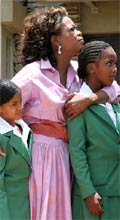
First of all, I think Oprah is AMAZING for what she has done founding a school for disadvantaged girls in South Africa, despite what all the CNN and FOX News naysayers have to say (about how she should be doing this in America, about how it's just a stunt, etc. etc.). You go girl! But puhleaze: you need to eat a sandwich or something! Don't hate me for saying this, but you are not looking well to me.
*

Now. President Bush: Why in the hell do you want to deploy more troops to Iraq? I cannot fathom it. You are an addict. You need to quit the crystal and stop listening to those "voices" in your head. If the draft were re-instated today, which may be neccesary to accomplish your god-awful plan, would you send your twins Jenna or Barbara Jr.? I think not. F---ing hypocrite. We need to get our soldiers out of harm's way there, and soon! Gimme a break. Let the Iraqis have their own country back.
*
Sorry for the rant. In other news, a lovely review of Kathleen Flenniken's Famous in the Seattle Times.
Sunday, January 07, 2007
Cinematic Techniques and Poetry
I've heard it said that it is "hard to be a poet living in an age of prose." But heck, let's face it, we're not living in an age of prose, we're living in an age of cinema. There is a fascinating entry in Dictionary of Poetic Terms, a book that I discovered via Brian Campbell's blog, about cinematic techniques, and how they have influenced contemporary poetry. A brief summary:
*
"Cinematic techniques are . . .devices of . . . narration and point of view borrowed from moving pictures." ". . . the authors know of no comprehensive work on the cross fertilization of the two art forms . . ." (hmmm . . . perhaps a thesis idea here?)
1) Cuts: the joining together of separate images/events
Straight cut: elements are connected linearly in time
Cross cut: two related elements happening at the same time
Contrast cut: joining seeming unrelated, or thematically contrasting or opposing elements
Jump cut: used to shorten time by skipping ahead
2) Transitions
Metaphorical dissolve: a spinning crime scene turns into a spinning newspaper headline
Form dissolve: a man trapped in whitewater turns into the image of his wife at a sink washing her hands
Sound dissolve: a baby's cry turns into a police siren
Thematic montage: a series of metaphorically related images, like a collage
Flashback : we all know what this is
Flashforward: see Merwin "For the Anniversary of my Death"
Substitute image: a predictable image replaced by an unexpected one
Voice of the narrator: obvious
3) Point of View
Range of view: distance of the camera from the scene
Establishing shot: as in Lawrence of Arabia, an opening with a shot of the desert over which a camel and rider move slowly
Deep focus shot: With this camera shot you can see background, middle ground, and foreground clearly. A view not possible with the naked eye.
Close-up shot: scrutinizing detail
Angle of view: refers to the elevation of the camera
Bird's eye view: as seen from the air, implying omniscience, condescension, or accusation
Low Angle shot: at the ground level looking up, dwarfs the viewer
4) Movement
A pan: panning horizontally, taking in the whole scene.
A movement shot: propels the viewer toward or away from the action.
*
I am fascinated by this. On the one hand, I want to know how poems are different than cinema. What can a poem do that a moving picture cannot? On the other hand, I want to take advantage of the richness of these "motion picture" effects in my poems. I’d be interested to know ways that you have used cinematic techniques, either consciously or unconsciously, in your poems.
*
"Cinematic techniques are . . .devices of . . . narration and point of view borrowed from moving pictures." ". . . the authors know of no comprehensive work on the cross fertilization of the two art forms . . ." (hmmm . . . perhaps a thesis idea here?)
1) Cuts: the joining together of separate images/events
Straight cut: elements are connected linearly in time
Cross cut: two related elements happening at the same time
Contrast cut: joining seeming unrelated, or thematically contrasting or opposing elements
Jump cut: used to shorten time by skipping ahead
2) Transitions
Metaphorical dissolve: a spinning crime scene turns into a spinning newspaper headline
Form dissolve: a man trapped in whitewater turns into the image of his wife at a sink washing her hands
Sound dissolve: a baby's cry turns into a police siren
Thematic montage: a series of metaphorically related images, like a collage
Flashback : we all know what this is
Flashforward: see Merwin "For the Anniversary of my Death"
Substitute image: a predictable image replaced by an unexpected one
Voice of the narrator: obvious
3) Point of View
Range of view: distance of the camera from the scene
Establishing shot: as in Lawrence of Arabia, an opening with a shot of the desert over which a camel and rider move slowly
Deep focus shot: With this camera shot you can see background, middle ground, and foreground clearly. A view not possible with the naked eye.
Close-up shot: scrutinizing detail
Angle of view: refers to the elevation of the camera
Bird's eye view: as seen from the air, implying omniscience, condescension, or accusation
Low Angle shot: at the ground level looking up, dwarfs the viewer
4) Movement
A pan: panning horizontally, taking in the whole scene.
A movement shot: propels the viewer toward or away from the action.
*
I am fascinated by this. On the one hand, I want to know how poems are different than cinema. What can a poem do that a moving picture cannot? On the other hand, I want to take advantage of the richness of these "motion picture" effects in my poems. I’d be interested to know ways that you have used cinematic techniques, either consciously or unconsciously, in your poems.
Saturday, January 06, 2007
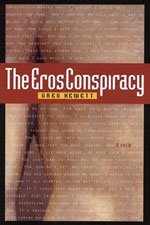

I'm reading a terrific new book of poems, The Eros Conspiracy, by Greg Hewett. It's a book-length sequence (doesn't it seem everybody is doing a book-length sequence these days?). There are no individual poem titles; instead, each poem begins with an italicized phrase that is a bit of language he has overheard "in life or on television," such as: Obviously I wanted you; I thought I could have you; Don't torture me this way. (In addition, these phrases are printed across the book's lovely cover, over the image of a man's naked torso).
The poems inter-twine several disparate themes and times: the history of beauty as seen in old classical art sculptures (mostly of nude boys and men), the beauty of history as seen in the life stories of several historical figures (many of them gay: Hart Crane, Oscar Wilde, Michelangelo, etc), a star-crossed contemporary love affair, the idea of "Revolution" both in the political sense and the artistic sense.
It's a fun read, and can definitely be seen as a single long poem, with the recurring gestures developing a cumulative power over the length of the book. For that reason, it's hard to quote individual poems, because they sometimes don't always stand up as well on their own, but really tend to depend upon each other, and the flow of the wonderful narrative (or argument) that Hewett is developing. Highly recommended. Here's a couple sample poems:
What are you wearing?
Something revolutionary, I hope.
A red bandana around your forehead,
hammer or sickle in hand?
Otherwise completely naked,
posed like some politburo version
of a CK model, without the porn
softened by an engineered erection
hidden in tedious white briefs.
Because I like my revolution raw
and having a replica of David
on the coffee table is so passe,
so declasse, so utterly bourgeois
for one in training to be the guerrilla
embodiment of a dirty old man.
(pg 19)
*
Couldn't we try again
to erect an angular colossus
of Marx on every Platz or hang
an acre of silk with Mao's iconic
countenance purely benevolent?
Couldn't we risk these figures
who shaped the world to their words
by sheer force? Or would we be better,
as you suggest, served by our own
images taken in the intimacy
of an automatic photo booth,
some for hiding in our wallets,
some for securing false identity
for a life of conspiracy,
for a life inspired?
(pg 42)
*
This last poem, I think, captures the essential issue: how to balance the private romantic inner life, with outer public civic/political existence.
Thursday, January 04, 2007
Working on revisions today, and a couple of new ideas. A huge hailstorm just blew through, leaving about a quarter-inch of white ice everywhere. Now the sun is pouring out, and everything is melted. Such unsettled weather.
*
Here's one old draft, that I think is getting closer:
Not Knowing
— for John
After all the tests are done, the good news:
It’s probably not your heart. The bad news:
It might be. Prinzmetal’s, coronary spasm,
micro-vascular angina equivalent —
all equivocations. The cardiologist
can’t say for sure, without going inside.
And you don’t want him to (an angio-
gram a not-entirely-benign
procedure). Not just yet. Why keep asking
the same question when you might not like the
answer? Such a fine muddle. How you wish
it were clear as the winter day your friend
walked his island path, pure as sunlight —
the dagger he felt — and lived to tell.
*
*
Here's one old draft, that I think is getting closer:
Not Knowing
— for John
After all the tests are done, the good news:
It’s probably not your heart. The bad news:
It might be. Prinzmetal’s, coronary spasm,
micro-vascular angina equivalent —
all equivocations. The cardiologist
can’t say for sure, without going inside.
And you don’t want him to (an angio-
gram a not-entirely-benign
procedure). Not just yet. Why keep asking
the same question when you might not like the
answer? Such a fine muddle. How you wish
it were clear as the winter day your friend
walked his island path, pure as sunlight —
the dagger he felt — and lived to tell.
*
Ellison to Use Jefferson Koran for Swearing In
This is a wonderful turn of events. Ka-pow! Take that you right-wing "KKKristian" conservatives.
By FREDERIC J. FROMMER
AP
WASHINGTON (Jan. 3) - The first Muslim elected to Congress says he will take his oath of office using a Koran once owned by Thomas Jefferson to make the point that "religious differences are nothing to be afraid of."
By FREDERIC J. FROMMER
AP
WASHINGTON (Jan. 3) - The first Muslim elected to Congress says he will take his oath of office using a Koran once owned by Thomas Jefferson to make the point that "religious differences are nothing to be afraid of."
Tuesday, January 02, 2007
Soy is Making Babies Gay!
From Derek Goodwin's funny-as-hell cruelty-free vegan blog:
"it has long been "known" by fundamentalist christians that homosexuality is a disease, and thanks to the investigative journalism of jim rutz there might now be a cure, or at least a reliable method of prevention! yes, my fellow male tofu eaters, it is true. if you have been oddly attracted to another man it could be because of our favorite little bean (jim didn't explain where lesbians come from, but i have a hunch it has something to do with seitan)." click to read full article
"it has long been "known" by fundamentalist christians that homosexuality is a disease, and thanks to the investigative journalism of jim rutz there might now be a cure, or at least a reliable method of prevention! yes, my fellow male tofu eaters, it is true. if you have been oddly attracted to another man it could be because of our favorite little bean (jim didn't explain where lesbians come from, but i have a hunch it has something to do with seitan)." click to read full article
Monday, January 01, 2007

For New Year's Day Dean and I went to see Stephen Frears' The Queen. What a wonderful little movie. Helen Mirren virtually channels Elizabeth in the days following the death of Princess Diana. She deserves a medal for her spot-on, heart-wrenching, ironic, dead-pan, and good-humored performance. The news footage and reenactments of the events leading to Diana's death, and it's aftermath, are incredibly moving: this viewer was almost in tears. Prince Charles is a total dork, mincing about and kow-towing to the Queen by taking his sons out hunting to Balmore Castle in Scotland in the days following their mother's sudden death. James Cromwell of Six Feet Under fame, perfectly cast as the Queen's consort Prince Philip, prances about in a kilt with his skinny legs, goes off to sleep in his own room, swears and hunts and bad-mouths Di. And what about Tony Blair: I did not remember he was a newly elected still-wet-behind-the-ears Prime Minister in his first months in office when Diana was killed. His handling of the situation ("She was the People's Princess"), and his often-conflicted advice to the bumbling cold-hearted Royal Family, probably helped save the monarchy from abolishment. In the end, this is Mirren's movie. She is a revelation. Amazing. Only she could make me again love the Queen. I'd kiss her ring in a minute. Go see it. You know you love these silly royals.
*
New Year's Eve we went to the neighborhood burn at Bradner Park: an old oil barrel bonfire, where we all gathered to toss in remnants from the year: a photo of Rumsfield shaking hands with Saddam, a magazine cover of our idiot president George Bush, someone's old medical records, a wooden frog from Thailand, a beat-up pinata, etc. Clare was shooting at the pyre with his gasoline squirt gun and causing huge flames to roar. Such a show!
Reading in the new issue VQR: a wonderful set of essays on the Lyric Poem, as well as some wonderful poems by friends Allen Braden ("Details of the Four Chambers of the Horse's Heart") and C Dale ("Sepsis").
Subscribe to:
Comments (Atom)


